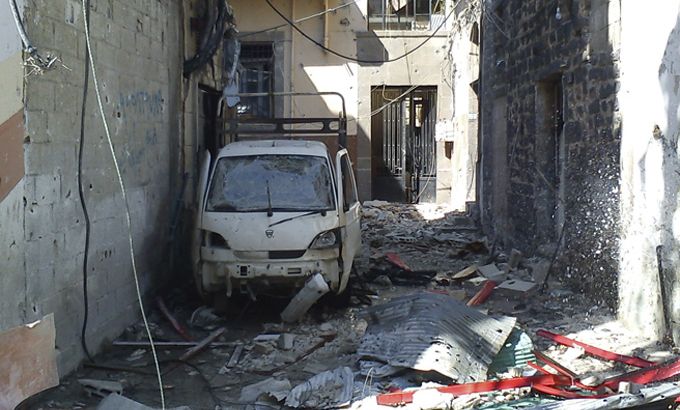US calls for tough action against Syria
Secretary of State Clinton urges Security Council to adopt arms embargo, even as Syria agrees to terms for UN observers.

The US has called on the UN Security Council to adopt an arms embargo and other tough measures against Syria to try to halt 13 months of bloodshed.
Addressing the so-called Friends of Syria group in Paris on Thursday, Hillary Clinton, US secretary of state, stopped short of calling for outside military intervention, but said it was time to impose more consequential measures on President Bashar al-Assad if his country failed to abide by a peace plan drafted by UN-Arab League envoy Kofi Annan.
“We need to start moving very vigorously in the Security Council for a Chapter 7 sanctions resolution, including travel, financial sanctions, an arms embargo, and the pressure that that will give us on the regime to push for compliance with Kofi Annan’s six-point plan.”
Clinton’s remarks came as Syria and the UN signed an agreement on the terms for the observer mission deployed under the Annan plan.
However, the question of whether the mission can expand while violence continues has yet to be resolved.
Both the government and the opposition have blamed each other for violations of a ceasefire which officially took hold on April 12.
Only seven of the 30-men strong advance mission have so far arrived in Syria, and the Security Council must pass a resolution allowing the full mission which could number up to 300.
Friday protests
The preliminary agreement states that observers will have freedom to go anywhere in the country by foot or by car, take pictures, and use technical equipment to monitor compliance with a shaky truce between government forces and opposition fighters.
But in a move likely to anger the opposition, the head of the team currently in Syria said they will not patrol on Fridays, the day of the week when the biggest numbers of protesters normally takes to the street.
“We don’t want to be used as a tool for escalating the situation. So we will avoid going on patrols on Fridays,” Colonel Ahmed Himmiche, from Morocco, said.
|
“They [the observers] are not there to solve the problems. They’re a conflict management instrument.“ – Timor Goksel, former UN spokesman |
Protests were reported in several locations on Friday, including in Damascus suburbs, Aleppo province, and the eastern city of Raqqa, where demonstrators were chanting slogans in solidarity with cities badly affected by the crisis.
Shelling was reported in several neighbourhoods of Homs, the central city where government forces have been fighting armed opposition groups for months.
Timor Goksel, a former UN spokesman who served with the UN Interim Force UNIFIL for more than 20 years in Lebanon, told Al Jazeera that the “worst mistake” people are doing in regards to the observer mission in Syria is to create expectations the monitors cannot fulfil.
“They’re not there to solve the problems,” he said. “They’re a conflict management instrument.
“When people see these observers cannot solve the problem, they will be disappointed, and they might withdraw their co-operation with them.
“They [the monitors] will be under tremendous pressure from all sides, to listen to them and agree with them. Every party of the conflict will try to get them on their side.”
Ban Ki-moon, the UN chief, has said he wants 300 unarmed observers sent on a three-month mission to work across the country.
China said on Friday that it is willing to send observers to join the advance team.
“We will continue to play a positive and constructive role in facilitating a fair, peaceful and proper resolution on the Syria issue,” Foreign Ministry spokesman Liu Weimin said.
‘Stop kidnappings’
Under Annan’s plan, the Syrian government is required to pull troops and heavy equipment out of towns and cities – which Ban said it has not done.
Thursday’s agreement obliges the troops to return to barracks located “a minimum of 2-3 kilometres outside the perimeter of these population centres”.
According to the deal, the Syrian government must allow unhindered access of UN personnel to facilities, locations, individuals and groups considered of interest.
As for the opposition, the agreement states that Annan must confirm that opposition fighters stop “all acts of aggression against Syrian army formations, bases, convoys and infrastructure … against government agencies, buildings, infrastructure as well as private and public properties” and “commit to stop all illegal activities … including assassinations, kidnapping or vandalism”.
At their meeting in the French capital, the Friends of Syria group called the peace plan the “last hope” to resolve the Syrian crisis, but cautioned that they were ready to consider “other options” if Annan’s mediation efforts broke down.
Foreign ministers of countries including France, the US, Saudi Arabia and Qatar said they would do everything to ensure the plan succeeded.
“Every day that passes means tens of new Syrian civilian deaths,” Alain Juppe, France’s foreign minister, said as he read out the conclusions of the meeting.
“It is not time to prevaricate. It is time to act. Though fragile, the Annan mission represents a last hope.
“If this were not to happen … the UN Security Council and international community would have to look at other options.”
Russia and China, two of Syria’s strongest allies, were conspicuous by their absence from the Paris meeting.
According to a UN estimate, more than 9,000 people have been killed in Syria since the uprising began in March last year. Authorities say more than 2,500 security personnel have been killed.